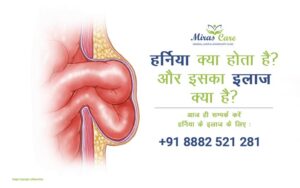FAQ About Hernia Surgery
If you or any of your loved has developed a hernia, you are most likely to have a lot of questions about it; especially, if you are a bit hesitant to talk about it. In this blog, we answer the most frequently asked questions about the hernia.
Right from enlisting hernia symptoms to throwing light on types of hernia surgery, risk factors of hernia and life after hernia surgery. Read on to clear all your doubts about the hernia.
Symptoms of Hernia
Most patients of hernia first feel a lump-like structure or pressure and tenderness around the groin area or in the abdomen. The lump may or may not cause pain, but the lump is easier to feel when the person is standing. But the lump is not the only symptom; hernia comes along with several other symptoms.
For your better understanding of hernia, here I enlist the most common symptoms of a hernia.
- Swelling and pain in the scrotum in men
- Feeling pain while lifting or moving a heavy item
- Pain during urinating or while passing the motion
- Pain in the abdomen or near the groin at the end of the day, especially if you spent a lot of time standing
Symptoms of hernia in infants
Infants are at higher risk of developing hernia because they have weak muscles. Parents may observe a lump when the child cries or coughs. The lump is also noticeable when the baby strains for a bowel movement.
When to see a doctor for hernia?
A person must not wait any longer to visit a doctor if he/she sees symptoms of a hernia. Because, the hernia can get strangulated causing cut off blood supply, which is extremely dangerous and can turn fatal. You must always remember that a hernia cannot be pushed back inside on its own, you need medical help. (Visit : Best Hernia Specialist in Gurgaon)
Also Watch : हर्निया क्या होता है और इसका इलाज क्या है ? – Best Hernia Specialist Delhi NCR Gurgaon India
Your hernia is a medical emergency when you already have a hernia and it suddenly becomes tender, painful and irreducible (unable to be pushed back inside).
In this case, the hernias become strangulated. This leads to cut off the blood supply of the intestine within the hernia sac and can eventually cause gangrenous (dead) bowel in a little time frame of a mere six hours. The patient also develops nausea, vomiting and bowel obstruction along with fever. Hence, this is an alarming situation.
Any delay in consulting a doctor can turn life-threatening. The patient must visit a surgeon so that the hernia can be controlled and to avoid the risk of strangulation of hernia.
What are the Best medical treatments for hernia?
The treatment of a hernia on if it is reducible or irreducible, or is strangulated. Majorly, there are two ways of treating a hernia:
- Traditional method
- Laparoscopic surgery
In the traditional method, the abdomen wall is opened and the bulging out lump is moved back inside the abdomen. The abdomen wall is closed and the weak part is strengthened with synthetic mesh. All this is done under anesthesia and the person will have deep cuts and some stitches.
The laparoscopic technique is a modern and less-invasive treatment alternative. In this technique, small fiber-optic instruments are inserted in the abdomen through very small incisions (cuts). A video camera is inserted from one opening through which the doctor monitors the instruments. This is also done under anesthesia.
The benefit of laparoscopic surgery is that it is painless, heals quickly and is less invasive. It is so fuss-free that the patient can return home on the same day as well. Laparoscopic surgery is your road to living life pain-free.
What happens after hernia surgery?
The patient resumes to the regular life within a few days after the hernia surgery.
- The patient might witness minor pain after the surgery for a few days. The pain is easily controllable with pain killer medications.
- There is also the possibility of tenderness, swelling and bleeding as well.
- Lifting any heavy item must be strictly avoided in the first few weeks after the surgery, as it might put a strain on the surgery area.
- How fast the patient resumes to the regular activities depends on the type of surgery. Laparoscopic surgery ensures the quickest recovery.
- The patient must consult the doctor before resuming driving and sexual activity.
Are there any complications after hernia surgery?
There are very fewer chances of occurrence of any complications after hernia surgery. However, it all depends on the kind of surgery you undergo and the surgeon who performs it. The complications are most likely to occur in the case of traditional surgery. On the other hand, laparoscopic surgery is a modern technique that involves minimal risk factors.
If you experience any of the below-mentioned issues after the surgery, you must immediately contact the surgeon.
- Excessive bleeding
- Fever
- Trouble in urinating
- Redness in the area of the surgical cut
- Severe pain
- Extreme tenderness or swelling
If you or any of your loved are in need of hernia treatment, contact MirasCare for the most hassle-free treatment by highly experienced surgeon Dr. Mir Asif Rahman


